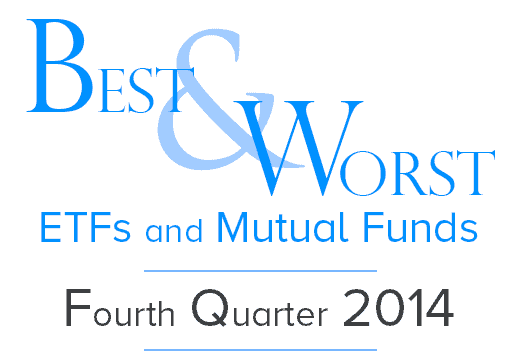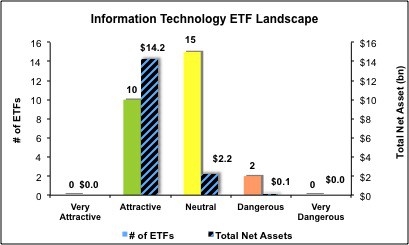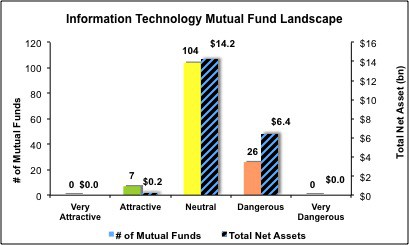The Information Technology sector ranks second out of the ten sectors as detailed in my sector roadmap. It gets my Neutral rating, which is based on aggregation of ratings of 27 ETFs and 137 mutual funds in the Information Technology sector as of July 11, 2012. Reports on the best & worst ETFs and mutual funds in every sector and style are here.
Figures 1 and 2 show the five best and worst-rated ETFs and mutual funds in the sector. Not all Information Technology sector ETFs and mutual funds are created the same. The number of holdings varies widely (from 25 to 416), which creates drastically different investment implications and ratings. The best ETFs and mutual funds allocate more value to Attractive-or-better-rated stocks than the worst ETFs and mutual funds, which allocate too much value to Neutral-or-worse-rated stocks.
To identify the best and avoid the worst ETFs and mutual funds within the Information Technology sector, investors need a predictive rating based on (1) stocks ratings of the holdings and (2) the all-in expenses of each ETF and mutual fund. Investors need not rely on backward-looking ratings. My fund rating methodology is detailed here.
Investors seeking exposure to the Information Technology sector should buy one of the Attractive-or-better rated ETFs or mutual funds from Figures 1 and 2.
See ratings and reports on all ETFs and mutual funds in this sector on my free mutual fund and ETF screener.
Figure 1: ETFs with the Best & Worst Ratings – Top 5
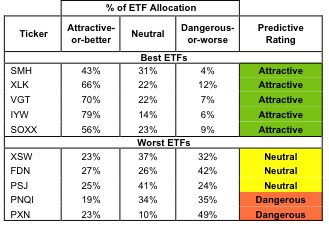
Sources: New Constructs, LLC and company filings
Focus Morningstar Technology Index ETF (FTQ) and ProShares Ultra Technology (ROM) are excluded from Figure 1 because their total net assets (TNA) are below $100 million and do not meet our liquidity standards.
Figure 2: Mutual Funds with the Best & Worst Ratings – Top 5
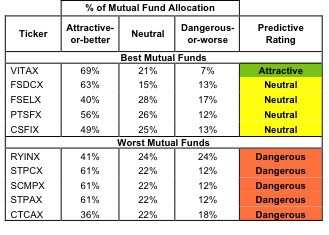
Sources: New Constructs, LLC and company filings
Six mutual funds are excluded from Figure 2 because their total net assets (TNA) are below $100 million and do not meet our liquidity standards.
Market Vectors Semiconductor ETF (SMH) is my top-rated Information Technology ETF and Vanguard World Funds: Vanguard Information Technology Index Fund (VITAX) is my top-rated Information Technology mutual fund. Both earn my Attractive rating.
PowerShares Lux Nanotech Portfolio (PXN) is my worst-rated Information Technology ETF and Columbia Funds Series Trust I: Columbia Technology Fund (CTCAX) is my worst-rated Information Technology mutual fund. Both earn my Dangerous rating.
Figure 3 shows that 182 out of the 619 stocks (60% of the total net assets) held by Information Technology ETFs and mutual funds get an Attractive-or-better rating. However, only 10 out of 27 Information Technology ETFs and 7 out of 137 Information Technology mutual funds (5% of total net assets) get an Attractive-or-better rating. Note that 86% of the value allocated to ETFs in the sector is allocated to Attractive-rated ETFs. Only 1% of the value in mutual funds goes to Attractive-rated funds. It appears ETF investors are much better at allocating to the best funds than mutual fund investors.
The takeaways are: ETF investors are allocating value to the most attractive investments and mutual fund managers allocate too much capital to low-quality stocks.
Figure 3: Information Technology Sector Landscape For ETFs, Mutual Funds & Stocks
As detailed in “Cheap Funds Dupe Investors”, the fund industry offers many cheap funds but very few funds with high-quality stocks, or with what I call good portfolio management.
Investors need to tread carefully when considering Information Technology ETFs and mutual funds. Only 10 ETFs and 7 mutual funds in the Information Technology sector allocate enough value to Attractive-or-better-rated stocks to earn an Attractive rating.
Activision Blizzard, Inc. (ATVI) is one of my favorite stocks held by Information Technology ETFs and mutual funds and earns my Very Attractive rating. ATVI’s current stock price (~$12.10) implies that after-tax profits (NOPAT) will permanently decrease by 40%. These expectations are overly pessimistic given that ATVI has been able to grow its profits and improve its operating margins each year since 2008. Low expectations and strong historical performance make ATVI an excellent long candidate.
InterNAP Network Services (INAP) is one of my least favorite stocks held by Information Technology ETFs and mutual funds and earns my Very Dangerous rating. INAP’s management has a long track record of poor capital allocation. The company’s dismal 0.6% return on invested capital (ROIC) places the company in the bottom 20th percentile of all Russell 3000 companies. Not once in the 14 years I’ve covered the company has it generated an ROIC over its weighted average cost of capital (WACC). During that time, the company has written off 43 cents for every dollar that has been invested in the business. And yet the stock’s valuation forecasts the company will have a phenomenal turnaround. To justify its current stock price (~$7.01), INAP must grow profits by 8% compounded annually for 30 years. The downside risk of this stock outweighs its upside potential.
539 stocks of the 3000+ I cover are classified as Information Technology stocks, but due to style drift, Information Technology ETFs and mutual funds hold 619 stocks.
Figures 4 and 5 show the rating landscape of all Information Technology ETFs and mutual funds.
Our sector roadmap report ranks all sectors and highlights those that offer the best investments.
Figure 4: Separating the Best ETFs From the Worst ETFs
Figure 5: Separating the Best Mutual Funds From the Worst Mutual Funds
Review my full list of ratings and rankings along with free reports on all 27 ETFs and 137 mutual funds in the Information Technology sector.
Disclosure: I receive no compensation to write about any specific stock, sector or theme.
